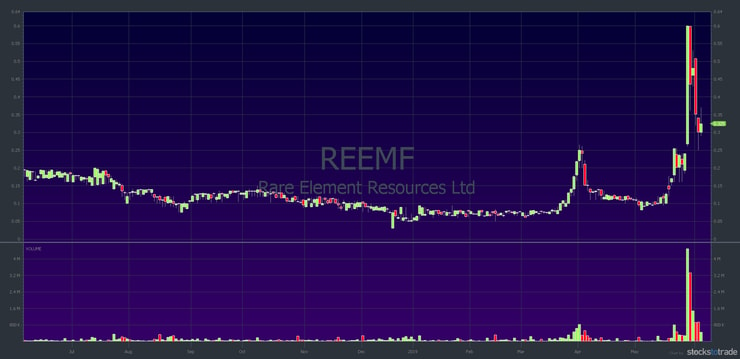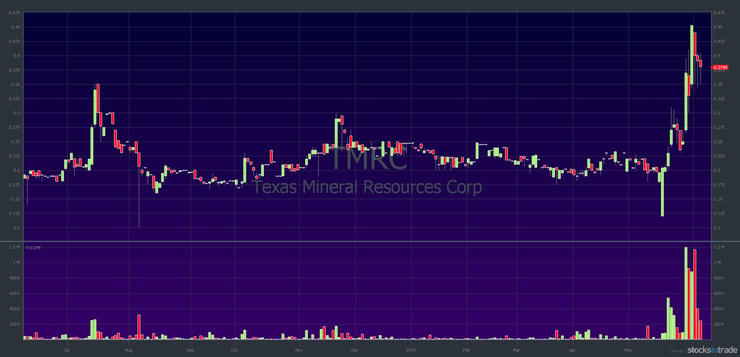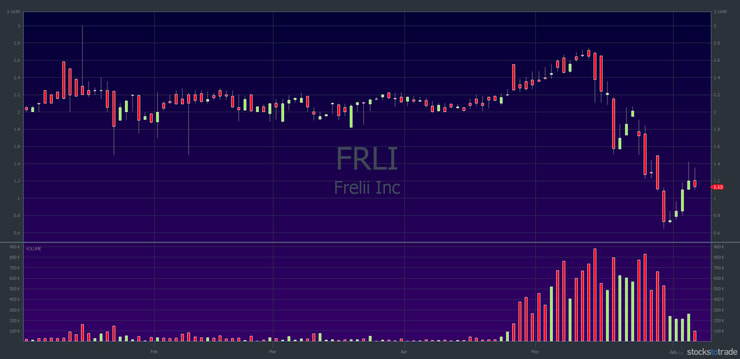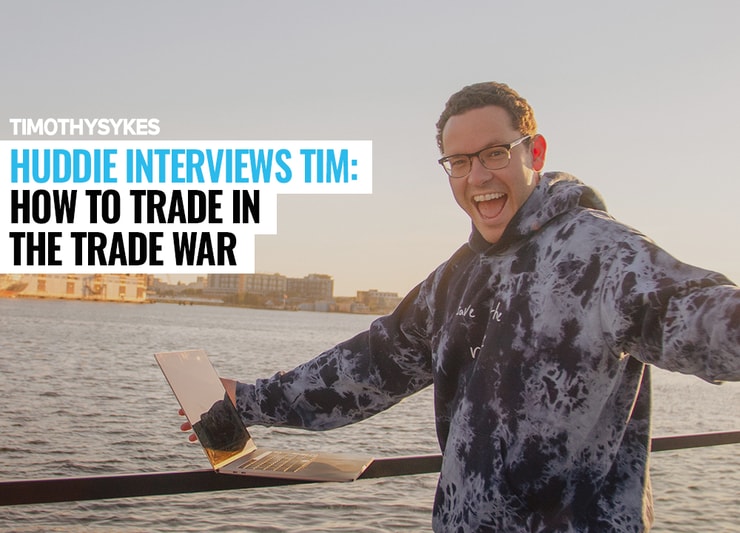One of the HUGE advantages of being a member of the Trading Challenge is…
… we talk about what’s going on in the world and how it affects markets. Sometimes it happens in my Q&A webinars, sometimes in chat, and other times I talk about it in video lessons.
Recently there’s been a LOT of press about trade war — first with China and now with Mexico. Since one of President Donald Trump’s main slogans is ‘America First,’ that’s not likely to change. Unless, of course, the U.S. can sign new deals with these and other countries.
All the trade war press brings up a lot of questions from both newbies and experienced traders alike. So I thought I’d address it.
But rather than just tell you what I think, I decided to get one of my top students to ask me some questions.
Mike Hudson, aka Huddie, is one of my top students. But he’s also young and hasn’t been trading that long. When it comes to economic cycles and events like trade wars, he hasn’t seen it all. I don’t mean that in a negative way at all.
Huddie’s doing amazing! But he hasn’t quite seen everything that maybe a trader with two decades of trading has. And he has some of his own opinions, as well. Quality nuggets here, so take notes.
Here it is…
… my recent Q&A with Huddie…
Table of Contents
Huddie and Tim Q&A
Huddie:
What’s your perspective on how to trade during a trade war?
Tim:
Just be careful. Overnight positions which I normally like — they’re kinda minimized during a trade war. You might wake up to the market down or up 2%, 3%, or 4%. A lot of the time it’s down.
It’s important to keep in perspective that this isn’t just a trade war. We also had a 20% market bounce before this trade war. And at least some of the bounce was based on expectations that the deal would be signed.
So expectations are very high. It’s not like we’re at multi-year lows. We’re at multi-year highs. My take: be careful. Especially on overnight positions.
More Breaking News
- Is Rocket Lab Skyrocketing Toward New Heights After Recent NASA Contract Win?
- Is SoFi on the Verge of a Major Makeover?
- Is Vistra’s Latest Surge More Than Just a Flicker of Market Optimism?
Huddie:
This trade war DOESN’T influence my personal trading style at all. Or the manner in which I trade…
Do you change the way you trade based on something like a U.S.-China trade war?

Tim:
I don’t care about the Chinese economy itself. I care about the reaction the market has. I wait and see. What’s the market’s reaction to tweets, overnight developments, and overnight articles? How does the market respond to intraday articles or intraday tweets?
You have to be more on your toes because there’s kinda this hostage-like situation going on right now. Our countries, our stock markets — everyone’s a hostage. And most people don’t even realize it.
You could just ignore it. For example, you might hold a stock overnight and say…
… “Oh, it’s a really good setup, the earnings are really good.”
Then the market opens down 5% the next day when some trade thing didn’t happen. So you just have to be aware of it.
Huddie:
On the U.S. side of things, the trade war has a negative effect on commodities, for example, soybean farmers in Missouri.
Whether it’s trade wars, Canada legalizing weed, or big movements in commodities futures — this type of macro news potentially brings volatility into the penny stock market.
If you’re prepared, you can capitalize on the most volatile of days.
How can we use macro factors and correlate them to sector momentum in penny stocks?
Tim:
Macro factors are bunk. You can’t correlate soybeans and oil and all that stuff. Try to stay away from commodities. Stay away from unpredictable stuff like that. You could even say that bitcoin is a commodity because it trades 24/7. I don’t really like holding stocks related to bitcoin overnight unless there’s a clear trend.
Which brings up another thing…
We’re not just at our highs — there’s also no clear hot sector right now. So there’s no point in pushing everything. You gotta think about everything as a whole.
It’s not just a trade war. It’s not just that the market is up so much. It’s not that we’re in June and the saying is “Sell in May and go away…”
All these things are combining to make me not want to trade very aggressively. Or very often. What’s the strategy working the most for me right now? Short squeezes. You might like those. Tim Grittani might like them. He claims to have made something like $100,000 last month going short some of them, long others.
But that’s not my pattern. Personally, I try to stay away from unpredictability. That’s my advice: stay away from unpredictability.
Huddie:
It’s tough to predict which penny stocks might come into play if there’s an escalation of trade tensions between China and the U. S.
Can you think of any that have ALREADY come into play?
Tim:
Yeah, there are some rare earth metals companies like Rare Element Resources Ltd (OTCQB: REEMF) and Texas Mineral Resources Corp. (OTCQB: TMRC). Both are up because China is threatening to hold back their rare earth metals.
(Rare earths are a group of 17 elements used for all kinds of tech like consumer electronics, military, and medical equipment.)
But that’s based on rumors — there’s not an actual press release from China. Only reporting by Chinese state newspapers suggesting rare earth metals could be used as leverage in trade talks.
The U.S. government is already seeking alternatives in Africa. The main problem is that China controls roughly 80% of the world’s processing facilities. So even if the U.S. finds some other source, it might take a while.
If China does do that, then it affects that sector and could have a knock-on effect. Like we saw with lithium — it spiked in the past with similar situations.
Check out the 1-year chart for REEMF:

That’s a nice looking chart, by the way. Check out the multi-day spike from mid-March until April. Then you see a beautiful cup and handle pattern. The breakout near the end of May is a full supernova.
Here’s the TMRC chart:

The TMRC chart isn’t as clean. But the stock has a history of spiking. The timing is clearly related to the rumors coming from Chinese newspapers. All the more reason to understand catalysts and learn the patterns I teach.
Huddie:
In my opinion, all penny stocks are crap — especially the Chinese ones. They structure most of their financings with dilutive financial instruments. So I think a trade war with China doesn’t make the likelihood of good penny stock plays any better or worse.
Considering the sketchy nature of many Chinese companies listed in the U.S., what’s your opinion?
Tim:
Yeah … I expect the worst out of every company. That way I’m not disappointed. Again, it’s not just the trade war. People have to stop thinking about the trade war itself. Think about the potential for developments that can affect the overall markets. Like the rare earth metals.
It doesn’t matter what it’s actually going to do to the economy or the individual companies. Remember that three out of four stocks often follow the overall market. So if the Nasdaq opens down 4% or 5% and you’re long a stock overnight…
… I don’t care how good the setup is. Especially if you’re long a stock that was a big percent winner the previous day … you might get wrecked.
Huddie:
In my opinion, it’s incredibly important to know and understand what’s going on around the world. Period. Can’t be naive about macro factors.
So final question…
When it comes to a trade war and its effect on the markets, how important is it to understand mass psychology?
Tim:
I don’t think you need to be aware of everything. Tim Bohen says you need to be physically fit. Some people say you need to be aware of everything. I don’t agree. I think that if you focus on patterns and rules, you can do this.
Consider this: a pump depends on how hard a boiler room somewhere— say Belize for the sake of argument — is pumping it. It doesn’t matter about anything else. That’s just the pattern. It’s like that with a lot of patterns.
FOR EXAMPLE: Frelii Inc (CVEM: FRLI) is a pump. It was going up, volume was increasing. It was up on mailers. And then it collapsed. This has nothing to do with China or the economy. It’s simply supply-and-demand pumpanomics. So you gotta understand pumps.
Check out the chart:

How important is it to understand mass psychology? Just study the video lessons, the DVDs, and the webinars. We have the biggest archive of patterns and rules and lessons. They show the effects of mass psychology.
But don’t try to guess on China. Don’t try to guess commodities. Don’t think of this as something big. You can’t predict that stuff.
You’re not rich enough, you’re not smart enough, and you’re not well-informed enough. None of us are. That’s key to understand.
We don’t have algorithmic trading … you know, we’re not machine learning here.
Focus on SIMPLE things.
The biggest problem with the trade war is it creates a big giant hole of unpredictability. That includes the overall market and specific sectors like rare earth metals.
Trade War Q&A Wrap
I want to give a special thanks to Huddie:
- First for being such a hard-working and dedicated student. It’s paying off, and I see more good things coming to him.
- Second, for taking the time to help me with this. As you know, I’m incredibly busy with charity work, teaching, and trying to get in a few trades when I’m in a good time zone…
Our community — the Trading Challenge and other programs on Profitly — is amazing. The amount of help and insight traders give to each other is incredible. I see Huddie in the chat room pretty much every day. He also makes video lessons to share both good and bad trades.
So, I’m grateful to have students like Huddie. Thank you!
If you’re ready to get started — and you should be — apply for the Trading Challenge today.
Are you a trader? How does the trade war affect your trading? Newbie — what have you learned today you can use going forward? Comment below, I love to hear from ALL my readers. Let’s give Huddie some love!





Leave a reply